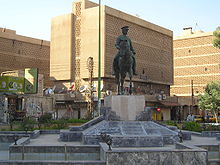Yassem Alwan

Jassem Alwan or Jazim Alwan ( Arabic جاسم علوان, DMG Ǧāsim ʿAlwān ; * 1926 or 1928 in Deir ez-Zor , Syria ; † January 3, 2018 ), wrongly also Qasim Alwan , was a Syrian officer and politician .
Live and act
Jassem Alwan, who came from a Bedouin family, had studied at the Homs Military Academy since 1946 and had already taken part in the Palestinian War in 1949 as a young lieutenant in the army . He had opposed the breakup of the Egyptian-Syrian Union in 1961 and on April 1, 1962, as garrison commander of Aleppo, he participated in a Nasserist coup attempt to restore the union.
In order to overthrow the Damascus regime , Syria's Nasserists, Baathists and other Arab socialists and socialist unionists had to ally. After the successful coup of March 8, 1963 , in which Yassem Alwan had played a key role (even if Syrian historiography later apparently kept silent about it), Alwan was appointed to the position of colonel and member of the 20-member Revolutionary Command Council, which initially included twelve Baathists and eight nasserists sat. The chairman of the command council and head of state was named Nasser-friendly officer Louai al-Atassi , who was Alwan's brother-in-law. Immediately after the coup, Syrian and Iraqi Baathists began talks with Nasser in Cairo about the restoration of the Union or about a triple Egyptian-Iraqi-Syrian federation .
Nasser, however, suspected that the Baathists only wanted to use his popularity to consolidate their own position. The Baathists, on the other hand, did not want to recognize Nasser's sole leadership. When the talks stalled and the Ba'athists began to purge Nasserists from the army and government, the Nasserist ministers resigned, including Jamal al-Atassi .
With Nasser's approval, Colonel Jassem Alwan launched a bloody attempted coup on July 18, 1963 . After fierce fighting in Damascus, the coup was crushed by the then Interior Minister Amin al-Hafiz , and President Louai al-Atassi was forced to resign. 27 officers involved were immediately executed , only Alwan and two others were spared at Nasser's request (according to other sources, also at the request of Presidents Tito of Yugoslavia , Boumedienne of Algeria and Arif of Iraq). Alwan was released on November 4, 1964 and then emigrated first to Egypt and later to the United Arab Emirates .
After the failure of the democracy movement led by Jamal al-Atassi (1980) and the uprising of the Muslim Brothers ( 1982 ), Alwan met with Iraqi and opposition Syrian Baathists in Amman, Jordan in 1984 at the congress of the Palestinian National Council . Although he no longer wanted to have anything to do with the Ba'ath, he let President Saddam Hussein join a Syrian opposition alliance ( Front for the Liberation of Syria ) in Iraq , which included al-Hafiz, of all people. Alwan gave an interview in Cairo in 1995 in which he sharply criticized the Syrian leadership. As part of an opening up of the regime, President Bashar al-Assad allowed him to return to Syria in 2005. Allegedly Mustafa Tlas is said to have stood up for him.
See also
swell
- Tabitha Petran: Syria , page 157 . 1972
- Itamar Rabinovich, Shaked: Middle east contemporary survey 1984-1985 page 648. 1987
- The Online Museum of Syrian History
- TIME Magazine of July 26, 1963: Syria: Throwing Away the Script
- Sami M. Moubayed: Steel & Silk - Men & Women Who Shaped Syria 1900-2000 , page 37f . Seattle 2006
Web link
- alarabiya.net Jassim Alwan, 47 years of political asylum in Egypt (Arabic text with photo)
Individual evidence
- ↑ The monument was dedicated to a group of important Baathists who also came from Deir ez-Zor
- ↑ Death report on gulfnews.com on January 14, 2018. Retrieved on June 18, 2018 .
- ^ Itamar Rabinovich : Syria under the Baʻth, 1963-66: the Army Party symbiosis , p . 232 . Tel Aviv / Jerusalem 1972
| personal data | |
|---|---|
| SURNAME | Alvan, Jassem |
| ALTERNATIVE NAMES | Alvan, Jassim |
| BRIEF DESCRIPTION | Syrian military and politicians |
| DATE OF BIRTH | 1926 |
| PLACE OF BIRTH | Deir ez-Zor , Deir ez-Zor Governorate , Syria |
| DATE OF DEATH | January 3, 2018 |
